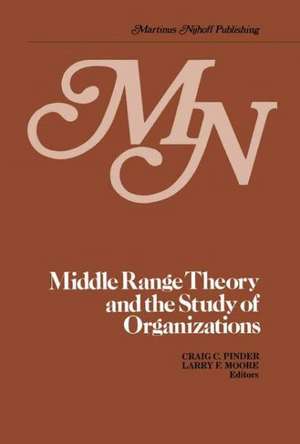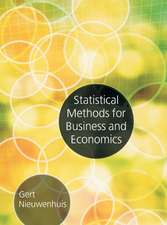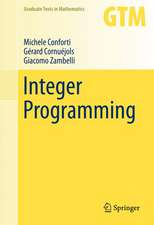Middle Range Theory and the Study of Organizations
Editat de C.C. Pinder, L.F. Mooreen Limba Engleză Hardback – 29 feb 1980
Preț: 1229.58 lei
Preț vechi: 1499.49 lei
-18% Nou
Puncte Express: 1844
Preț estimativ în valută:
235.31€ • 243.09$ • 195.84£
235.31€ • 243.09$ • 195.84£
Carte tipărită la comandă
Livrare economică 26 martie-09 aprilie
Preluare comenzi: 021 569.72.76
Specificații
ISBN-13: 9780898380217
ISBN-10: 0898380219
Pagini: 434
Ilustrații: XVI, 413 p.
Dimensiuni: 155 x 235 x 29 mm
Greutate: 0.79 kg
Ediția:1980
Editura: SPRINGER NETHERLANDS
Colecția Springer
Locul publicării:Dordrecht, Netherlands
ISBN-10: 0898380219
Pagini: 434
Ilustrații: XVI, 413 p.
Dimensiuni: 155 x 235 x 29 mm
Greutate: 0.79 kg
Ediția:1980
Editura: SPRINGER NETHERLANDS
Colecția Springer
Locul publicării:Dordrecht, Netherlands
Public țintă
ResearchCuprins
1. Toward Middle Range Theory: An Overview and Perspective.- I. What is Middle Range Theory?.- 2. Middle Range Theory and the Strategies of Theory Construction.- 3. Middle Range Theory: An Overview and Assessment for Organizational Research.- 4. Characteristics of Middle Range Organizational Theories and Their Implications for Operationalization and Testing: A Conceptual Analysis with Empirical Illustrations.- 5. Commentary on Gilfillan, Morrow-Muchinsky, and Bluedorn-Evered: The Circle of Inquiry.- 6. Metaphors, Theories, and the Processes of Scientific Inquiry: A Reply to Pondy.- II. Why and How Does Middle Range Theory Develop?.- 7. The Inevitability of Multiple Paradigms and the Resultant Need for Middle Range Analysis in Organization Theory.- 8. Middle Range Theories of Organizational Behavior: Some Implications for the Development of Theory.- 9. Middle Range Theories: Clusters of Clusters of Organizational Phenomenon.- 10. Nomothetical Nets and Higher Order Factor Analysis in Middle Range Theory Development.- 11. On the Potentialities of Middle Range Theory.- 12. Reply to Benson’s Comments in “On the Potentialities of Middle Range Theory”.- 13. Zen and Science.- III. General Frameworks for Middle Range Theorizing.- 14. Evolution and Middle Range Theories: Toward a Matrix of Organizational Modes.- 15. Organizational Speciation.- 16. The Resurrection of Taxonomy to Aid the Development of Middle Range Theories of Organizational Behavior.- 17. Functionalism as a Base for Midrange Theory in Organizational Behavior/Theory.- 18. Organizational Implications of Exchange Theory: Is It Time for a General Middle Range Theory?.- 19. A Step out from the Middle: Thoughts Stimulated by Papers of McKelvey, Bigelow, Behling, and Larwood.- 20. A Rejoinder to Nord.- 21. SomeOther Parts of Exchange Theory.- IV. Examples Of Middle Range Theory.- 22. Middle Range Organization Theorizing: Role Theory as an Example.- 23. Limited Domain Theories of Organizational Energy.- 24. Relationships between Modes of Social Interaction.- 25. The Applicability of Middle Range Theories to the Study of Organizational Effectiveness.- 26. On Research in Organizational Socialization: The Case for Middle Range Theory.- 27. Examples of Middle Range Theory: Discussion.- 28. A Rationale for the Limited Domain Approach to the Study of Motivation.- V. Counterpoints and Alternatives.- 29. Theory Development in Organization Behavior: A Systems’ Perspective.- 30. Having One’s Cake and Eating It Too: Middle Range Content and Generalized Process as Ways of Understanding Organization.- 31. Discussion of “Theory Development in Organization Behavior” by Cooper and Wolf and “Having One’s Cake and Eating It Too” by Frost and Hayes.- 32. A Piece of Cake: A Response to McKelvey.- VI. Contemplative Panel Discussion.- 33. Exploring Big Fierce Theories.- 34. Middle Range Themes in Organizational Theorizing.- 35. Science as a Social Reality.










